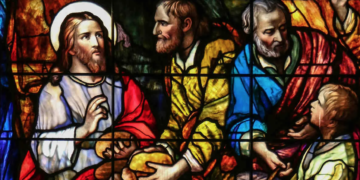hen I was in college, not yet a Catholic but starting to “hang around” with Catholics, I was taken aback one day when I heard the words, “forgive us our trespasses, as we forgive those who trespass against us.” I heard those words growing up, but their significance had never quite hit me. “Forgive me, God, the way I have forgiven others?” Given how bad I am at forgiving others, that seems more like a prayer for condemnation rather than forgiveness. It seems like the prayer should be: “Forgive me, Lord, a whole lot better than I forgive others.”
But that’s not what Jesus said. And there is something instructive about saying that prayer and taking it seriously. It challenges you to think: “How well do I forgive people?” Because, if I’m not forgiving others, what do I expect God to do? Or to put this another way: Given how much God has forgiven me – like a $10 billion debt that I could never repay – how in the world could I justify not forgiving someone a puny $10 debt?
When I was young, my parents took me to different Protestant churches. Some were “debtors,” others “trespassers.” I am grateful that the Catholics settled on “trespasser,” so I don’t have to worry when we get to that part of the prayer. I’m anxious that if I say the wrong thing, people will stare at me with a look that says: “One of them! Who let you in here?” I’ve never had anyone do that, but I was anxious about it anyway, probably because television and movies enjoy portraying all Christians as judgmental prigs.
It makes me wonder whether I’ve ever given anyone a look that would make him feel anxious. If I did, I hope he would forgive me. And if some people ever did give me that look, I hope I would forgive them, and not walk out of the church saying, “Those Christians in there are so rude! A good Christian would be more forgiving.”
It’s a similar problem when we say to ourselves something like: “I’m not proud and arrogant; I don’t put myself above others – like those people!” And then if you really get on a roll, you say: “Actually, no one is less proud and arrogant than me! In fact, I think I probably surpass everyone in my church in humility and not putting myself above others.”
Stated that way, that problem is pretty obvious. But I’m often struck, both in myself and in others, by how easy it is to forget how much we’ve been forgiven. You’d think, by how much hatred and vitriol people spew out, that they’d never been forgiven anything. “Did you see the terrible thing those people did? Why, it’s unforgivable!”

Really? Uh oh. If doing x, or not voting for y, or forgetting to do z is “unforgivable,” we’re all in real trouble, because we’ve all done things (in our hearts and fantasies, if not out in public) a lot worse than x, y, or z. And it’s not like God doesn’t know. There’s nothing hidden from Him.
“But they have to repent!” you say. To God, yes; not to me. If God were waiting for an adequate repentance from us to forgive us, He wouldn’t have sacrificed Himself on the Cross before we repent. He forgives us and then we repent so that we can enjoy the fruits of that forgiveness. We don’t earn God’s forgiveness. If God doesn’t wait for our repentance to forgive, why would I? And let’s be honest, how much begging would people have to do before I relent? Would it ever be enough?
Christ said, “The measure with which you measure is the measure with which you shall be measured.” That’s terrifying. But I suppose you could take it as a challenge. People in training will sometimes say to their coach: “Push me just like you would push an Olympic athlete.” You say that even though you know you’re not an Olympic athlete but want to set a high standard for yourself.
So, in a related way, you could say “Okay, God, measure me the way I measure others. If I’m unfair to someone, you blast me with another 500 pushups until I wise up.” (Those would have to be “spiritual” push-ups of some kind, I guess, but you get the idea.)
The point is, you would be saying to God: “Yes, I take responsibility for the way I forgive others. I know you have forgiven me a lot – a whole lot (in fact, let’s not get into the details right now) – so now I intend to ‘pay it forward.’ So God, you hold me to that standard because I want to be like You and love with the kind of love You showed in and through Christ.”
The God who reveals Himself in the Scriptures is a God of justice. So yes, we must seek justice. We cannot simply let murderers and rapists and rapacious dictators and graft-taking politicians roam free to plunder the innocent. But it is one thing to discipline our anger at injustice in order to bring about justice, reconciliation, and peace; it’s another thing altogether to let our anger run wild so we feel “justified” excoriating and abusing those we consider “vile,” “sinful,” and “reprobate” (totally unlike us, of course).
When progressives or conservatives let their self-righteous anger cause them to think they can say or do “whatever it takes” to demean and defeat their hated enemies, they had better step back and remember how evil they themselves have been and how much they have been forgiven.
You have to wonder sometimes, when you hear the anger, hatred, and vitriol spewed out daily whether these people somehow live under the illusion that they’ve never sinned, that they’ve never been forgiven, and that the measure with which they measure – that little, tiny bit of thimble-sized tolerance they show – won’t be the measure with which they will be measured.
Source: © 2024 The Catholic Thing.
















